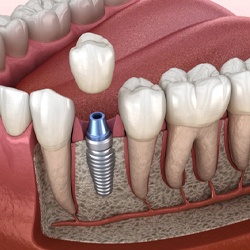
Dental Implant Failure & Salvage – Sagamore Hills, OH
Saving Your Newly Rebuilt Smile
Once your missing teeth have been replaced with dental implants, you can expect your new smile to last for decades – if not a lifetime – with the proper care and maintenance. In fact, when placed by a skilled professional like Dr. Dan Greenwood, dental implants are successful in over 95% of cases. Despite their high success rate and lifelike qualities, there is still a small chance that a dental implant may fail. While it’s quite rare for one of our patients to experience a failed dental implant in Sagamore Hills, you should contact our team at Greenwood Dental right away if you suspect something is wrong. That way, we have the highest chance of saving your newly rebuilt smile.
Why Do Dental Implants Fail?

A dental implant can fail for a number of reasons, but by far the most common one is a gum infection called peri-implantitis. When bacteria infect your gums, they can weaken the tissue that keeps your implant in place, causing it to lose support and eventually fail entirely. Peri-implantitis is usually the result of poor oral hygiene, so daily brushing and flossing (as well as regular dental checkups and cleanings) are the best ways to prevent it.
Other reasons why dental implants may fail include:
- Tobacco use.
- Injury to the mouth, jaw, or face.
- Failure of osseointegration (the process of the implant fusing with the jawbone).
- Certain medical conditions that can compromise the immune system, such as cancer or poorly controlled diabetes.
Signs of a Failed Dental Implant

If dental implant failure is going to occur, it will most likely be during the first few months after placement. However, it’s also possible for dental implants to fail several months or even years down the line. In any case, we urge you to call us immediately if you notice any of the following symptoms:
- Intense pain after your dental implant surgery – Some discomfort is normal, but it should begin to subside after two or three days.
- Bleeding, swelling, or pus near the implant site – While some bleeding and swelling are normal after your surgery, they should also fade with time. Pus, on the other hand, almost always indicates an infection.
- Difficulty chewing – Dental implants in Sagamore Hills function just like your real teeth, letting you eat your favorite foods with ease. If you’re having trouble chewing, then your implant may have failed.
- Feeling like your implant is loose – Your implant should remain firmly embedded in your jaw and not loosen. There’s a chance that the restation on top of the implant might be what’s loose, not the implant itself. Either way, Dr. Greenwood will need to take a look.
How Dental Implant Salvage Works

At Greenwood Dental, we want all of our patients to enjoy healthy smiles for life. For this reason, we ask that you let us know right away if something might be amiss with your dental implants. Once Dr. Greenwood has closely examined your mouth, he can identify the cause of the problem and go over possible treatments that will help you enjoy a complete and healthy smile again.
The treatment we recommend will depend on the severity of the issue. In some cases, you might only need a deep cleaning and/or a topical antibiotic to save your implants. However, if the infection has progressed to the point where your gums and jawbone are damaged, we might have to remove your implant and give you some time to heal. If you plan on eventually replacing your implant, we can discuss bone grafting as a way of strengthening the area and giving your new implant a strong foundation.